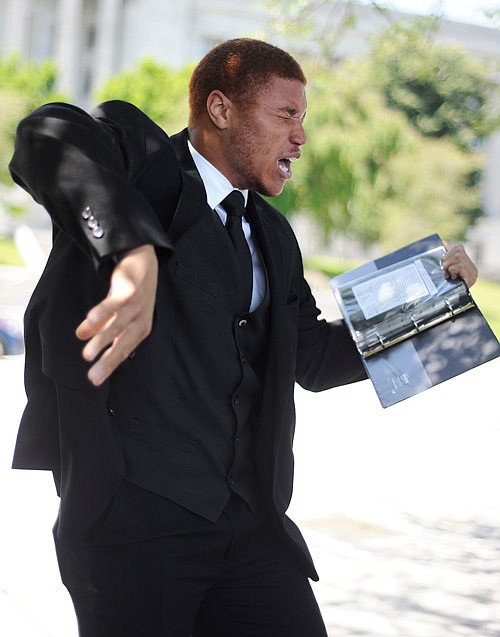Mitchell Huston, 17, won second place last week in the prose category at the 2017 National Speech and Debate Tournament in Birmingham, Alabama - an accomplishment bolstered by the fact it was only Huston's first year on the team at Jefferson City High School.
The piece Huston performed was titled "Not a Genuine Black Man," based on the memoir of the same name of Brian Copeland, an actor, comedian, radio talk show host and playwright.
By all appearances, Huston, an incoming senior, invests all of himself physically and emotionally into his delivery.
"My watch came off a few times during this performance" at nationals, he said as, with foresight, he slipped it off his wrist before delivering it again.
Copeland writes in his memoir about receiving an anonymous letter that read, "As an African-American, I am disgusted every time I hear your voice, because you are not a genuine black man."
"I am a black man," Huston told the audience, transitioning from Copeland's words to his to speak in his own voice in the moment. "Or at least that's the label that I'm given. Maybe African-American, maybe even Native American, but never really Irish-American; that's where I get the red hair from. And, as a mixed ginger, I don't really fit into the stereotypical spectrum of a typical black man.
"Just like Brian Copeland, I was brought up in a predominantly white neighborhood, where I was confused on whether I should be white or black' I have also had to hear the phrase that I am 'Not a Genuine Black Man,' by Brian Copeland."
Huston explained the turn of phrase in the last sentence is a way to cleverly segue from the "teaser" of the performance - when he talks about himself - into announcing the title of the piece, then into the author's words.
Those words talk about Copeland's experiences of being confused about his racial identity growing up, especially when other people, black and white, were constantly trying to define it on their own terms for him. It didn't help Copeland that his father was abusive.
Huston captured all the different characters of the piece in the performance, changing not only the tone but the pitch and other characteristics of his voice to portray voices of others - Copeland, Copeland's father as he angrily strangled his son, and Copeland's distraught mother as she watched and promised to never let Copeland's father hurt him again.
The emotional climax of the piece is when Copeland fantasizes about confronting his father with the anonymous letter that makes the titular accusation: "I'd track down his address, I'd go up to his door and I'd politely knock. He'd open the door, and I'd take the letter, and I'd shove it right in his face, and I'd take him by the shirt and I'd say, 'I want to apologize for not meeting your racial expectations'" of dealing drugs, not being a responsible father, living in a violent neighborhood and going to jail.
Through it all, Huston captures the subtle emotional and physical tics one might expect but otherwise miss: a scream that cracks; a shaking, clenched fist; or a trembling chin.
"I never really thought that I'd be that good at acting," he said. However, acting did come to him, and it would seem he draws power from the message of the piece itself.
"You should be sending a message," he said of dramatic interpretation, adding the message of Copeland's work is a "really powerful message people need to know."
"I know a lot of people that feel that way" - trapped in boxes of who they ought to be, as defined by others, along lines like race and class. "These stereotypes don't have to define you."
When it comes to speech and debate, Huston isn't entirely about drama; he actually went to nationals for the event of "humorous interpretation." He got knocked out of contention in the eighth round, but fell back on his supplemental competitive event - with only one day between being knocked out and having to deliver his prose performance.
He scrambled to prepare the final cut, but it clearly paid off. He said he was told he would have gotten first place, if not for his performance going too far over the 5 1/2-minute time limit.
He credited his success to all the people at nationals or watching online to support him, and those who got him to that point: his three biggest fans are his mom, Eleanor Huston; his dad, Mitchell Huston Sr.; and his maternal grandfather, Carl Evans.
He had special thanks to give for his friend and captain, Will Henrickson, and his coaches, Jordan Hart and Kristi Moore. His mentor is Jason Groce, and his sister Elishia Taylor and aunt Audrey Tabor are supporters, too.
Henrickson convinced him speech and debate could be fun; and while it was tough for him to balance practice with football, Huston urged other athletes to give it a try. "You can still at least come in and at least try," he said.
As for next year, he's hoping to do a duo performance with teammate Leticia Nketiah, whom the News Tribune recently profiled. Nketiah also competed at nationals, along with JCHS teammates Kelsey Bartlett, Catherine Blotevogel, Henrickson, Lucy Liao, Michael Manda and Michael Waggoner.
Audio Link:
Excerpt of Mitchell Huston performing "Not a Genuine Black Man"

